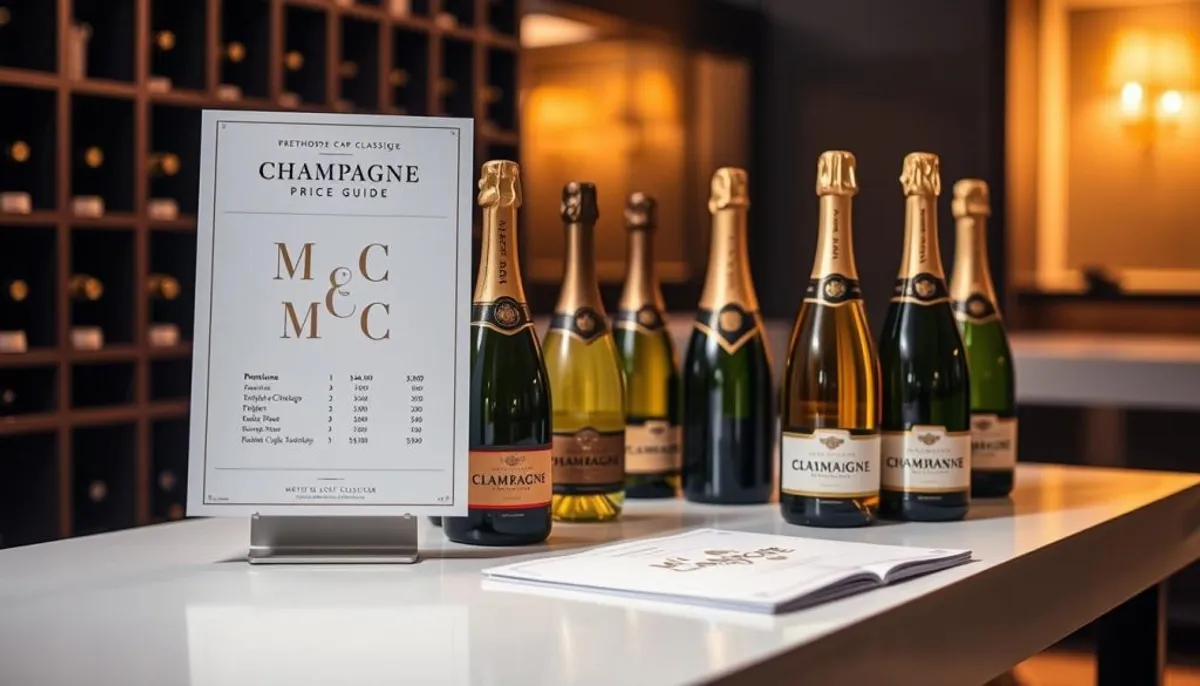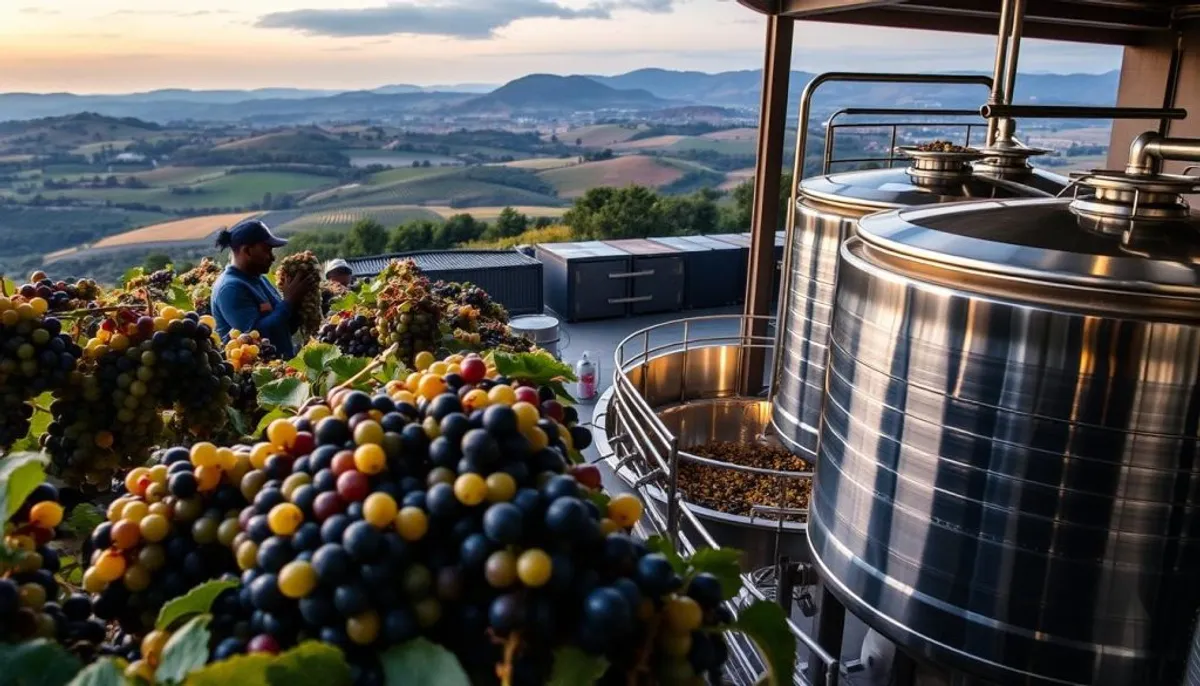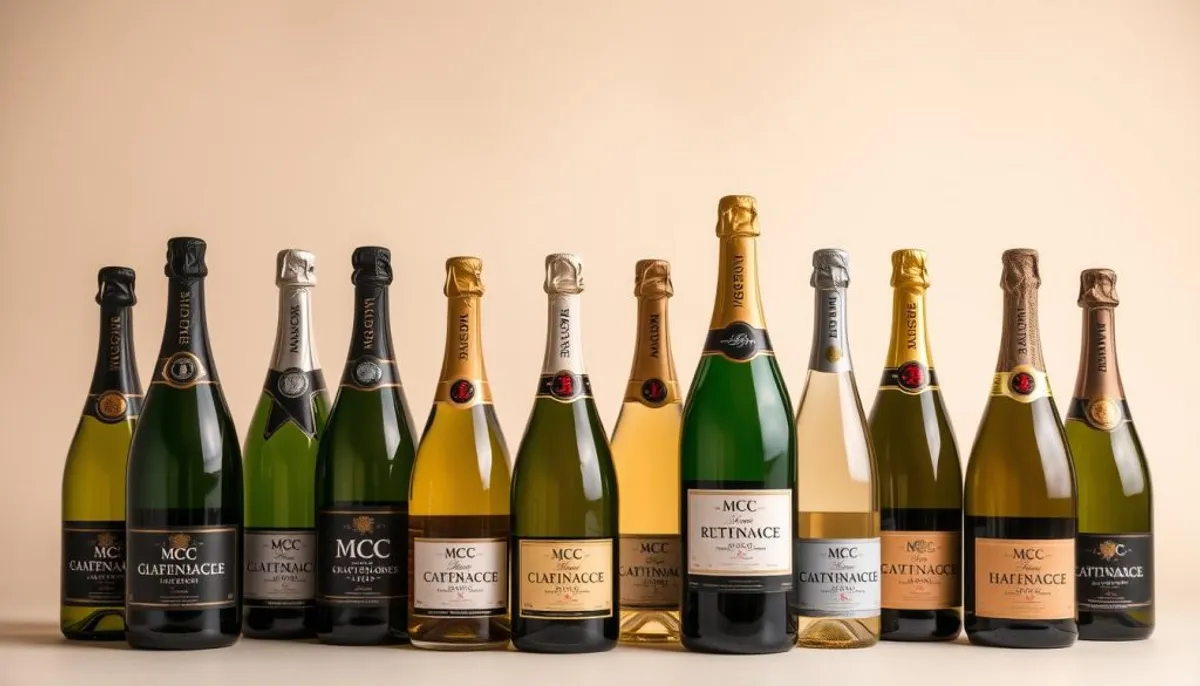Explore the realm of luxury sparkling wine pricing with our comprehensive MCC champagne price guide. Méthode Cap Classique (MCC) stands as a premium alternative to traditional Champagne, captivating the hearts of wine aficionados globally. As the allure of these exquisite bubbles intensifies, grasping their value is crucial for both seasoned connoisseurs and casual enthusiasts.

MCC wines, crafted through the same traditional method as Champagne, offer luxurious effervescence at a more accessible price. Unlike Champagne, which commands a price tag exceeding R500 per bottle, MCC can be enjoyed for approximately R200. This disparity in pricing positions MCC as a compelling choice for those desiring premium sparkling wine without financial strain.
The charm of MCC transcends mere affordability, extending to its superior quality. Like Champagne, MCC undergoes a meticulous aging process, ranging from 15 to 36 months on the lees. This prolonged contact period imbues MCC with complex flavors and a refined texture, solidifying its status as a luxury sparkling wine category.
Key Takeaways
- MCC offers luxury bubbles at a more affordable price than Champagne
- Champagne typically costs over R500, while MCC averages around R200
- MCC uses the traditional Champagne method for production
- Aging on lees for 15-36 months contributes to MCC’s complex flavors
- MCC presents a high-quality alternative to traditional Champagne
Understanding MCC and Traditional Champagne
Sparkling wines are often associated with joyous occasions. Méthode Cap Classique (MCC) and traditional Champagne stand out as luxurious choices, differing in price. MCC, a more affordable option, rivals the quality of its French counterpart without the hefty price tag. Many celebrations are complemented by refreshing mimosas, making MCC an ideal choice for those looking to enjoy sparkling wine in a festive setting.
What is Méthode Cap Classique (MCC)
MCC is South Africa’s response to Champagne, adhering to the traditional method but barred from the Champagne name by geographical rules. It typically retails at R200 per bottle, providing a remarkable value proposition. The MCC category is expanding, with 252 producers in South Africa and a 18% annual increase in production.
The Traditional Champagne Method
Champagne, exclusively crafted in France’s Champagne region, adheres to stringent regulations. Its cost is a reflection of its prestigious origin and the meticulous craftsmanship involved. It employs specific grape varieties and undergoes a secondary fermentation lasting 15-36 months on the lees, contributing to its distinctive flavor profile.
Key Differences Between MCC and Champagne
Though both employ similar methods, MCC offers a broader range of grape varieties, resulting in unique flavors influenced by South African terroir. MCC is characterized by its bright acidity and flavors of ripe berries and tropical fruits. In contrast, Champagne presents a more complex palate with notes of citrus, peach, and toasty undertones. MCC’s minimum lees aging is nine months, with plans to increase to fifteen, whereas Champagne requires a minimum of 15 months for non-vintage and 36 for vintage wines.
| Characteristic | MCC | Champagne |
|---|---|---|
| Average Cost | R200 per bottle | R500+ per bottle |
| Production Location | South Africa | Champagne, France |
| Grape Varieties | More flexible | Chardonnay, Pinot Noir, Pinot Meunier |
| Minimum Lees Aging | 9 months (increasing to 15) | 15 months (non-vintage), 36 months (vintage) |
MCC Champagne Price: Understanding the Market
The MCC champagne price presents a remarkable value proposition when compared to traditional Champagne. Typically, Champagne exceeds R500 per bottle, yet MCC can be acquired for roughly R200. This disparity makes MCC an enticing choice for those desiring luxury without the financial strain. If you're looking to indulge in this exquisite beverage, you can easily buy champagne online.
Elite brut champagne prices, on the other hand, can escalate significantly. In South African supermarkets, Moet & Chandon Nectar Imperial is priced at R650, while Dom Perignon P2 commands a staggering R6,000. In contrast, MCC stalwarts like Graham Beck Brut and Steenberg 1682 Brut are accessible for R200.
| Wine Type | Average Price (ZAR) | Popular Brand Example |
|---|---|---|
| MCC | 200 | Graham Beck Brut |
| Champagne | 650+ | Moet & Chandon Nectar Imperial |
| Sparkling Wine | 100 | Various Local Brands |
The MCC market has established itself as a premium sparkling wine segment. It delivers superior quality at prices more attainable than French Champagne, appealing to both casual drinkers and celebrants. MCC’s popularity is evident in its presence in 4 and 5-star hotels, resorts, and upscale dining establishments across South Africa, highlighting its increasing stature.
Factors Influencing MCC Wine Pricing
The cost of Méthode Cap Classique (MCC) wines stems from a complex interplay of production elements. Grasping these factors enhances our understanding of the value in each bottle. This ranges from entry-level to those with prices rivaling prestige cuvée.
Production Methods and Costs
MCC production mirrors traditional Champagne methods, being labor-intensive. Hand-harvesting and meticulous grape selection elevate costs. The secondary fermentation process, lasting at least 12 months, generates natural bubbles. This process also increases production expenses.

Aging Requirements
Aging is a critical factor in MCC pricing. While a minimum of 12 months is required, premium MCCs often age longer. Bon Courage Estate, for instance, ages their vintage Cap Classiques for at least 48 months on lees. Spier recently introduced a 2013 vintage with 84 months of lees contact. This trend towards extended aging significantly impacts price.
Grape Selection and Quality
Grape quality is essential in MCC production. Traditional Champagne varieties like Chardonnay and Pinot Noir are prevalent. South African producers also incorporate Sauvignon Blanc and Chenin Blanc. The choice of grapes directly influences both taste and price, with premium selections commanding higher prices akin to grand cru Champagne values. Additionally, the allure of luxury hypercars often parallels the prestige associated with these premium wines.
These elements combine to create a diverse MCC market. Entry-level prices can drop as low as R109 during promotions. Premium bottles, on the other hand, rival international sparkling wines in quality and price. The growing popularity of MCC is evident, with South Africans spending R121 million on brut and R114 million on demi-sec in a 12-month period. This reflects MCC’s increasing value in the wine world.
Premium MCC Varieties and Their Price Points
MCC, an acronym for Millesime (vintage) champagne, offers a spectrum of luxurious bubbles across various price ranges. From entry-level to luxury labels, including the esteemed schramsberg blanc de noirs, MCC caters to every budget and occasion, providing a diverse array of choices.
Entry-Level MCC Options
Affordable MCCs typically retail around R200 per bottle, offering superior value compared to vintage champagne rates. These wines serve as an excellent gateway to the sparkling wine world, featuring crisp flavors and lively bubbles.
Mid-Range Selections
Mid-range MCCs, priced between R300-R400, exhibit enhanced complexity. Krone Borealis Cuvée Brut, aged in the bottle, exemplifies this category with its rich, nuanced profile. These wines often undergo 15-36 months of lees aging, which boosts their depth and character. A stylish champagne trucker hat can complement your tasting experience, adding a fun flair to your wine outings.
Luxury MCC Labels
Premium MCCs, while more expensive, still offer substantial savings compared to French Champagne. Graham Beck MCC, known as the “Bubbly of Presidents,” represents this category. These top-tier wines undergo meticulous production, including daily riddling at a 45° angle to ensure sediment removal.
| Category | Price Range | Notable Example |
|---|---|---|
| Entry-Level | ~R200 | Villiera Brut Natural |
| Mid-Range | R300-R400 | Krone Borealis Cuvée Brut |
| Luxury | R500+ | Graham Beck MCC |
Regional Variations in MCC Production
The realm of luxury sparkling wine pricing transcends Champagne’s borders. Méthode Cap Classique (MCC) from South Africa emerges as a notable alternative to the high costs of premium French bubbly. MCC production is witnessing a remarkable 15% annual growth, attracting wine aficionados to explore various regional offerings.
South African MCCs are distinguished by their unique terroir influences. The Western Cape’s cool climate regions are responsible for producing crisp, elegant bubbles. Coastal areas like Stellenbosch and Franschhoek Valley yield MCCs with vibrant acidity and mineral notes. In contrast, inland regions such as Robertson contribute richer, fuller-bodied sparkling wines.
Quality MCC production extends beyond South Africa’s borders. Australia’s cooler regions, notably Tasmania and Adelaide Hills, are renowned for crafting exceptional sparkling wines. These areas benefit from extended, slow ripening periods, resulting in grapes with optimal acidity for premium bubbles.
| Region | Notable Characteristics | Price Range |
|---|---|---|
| Western Cape, South Africa | Crisp, mineral-driven | $18 – $50 |
| Tasmania, Australia | Delicate, high acidity | $25 – $80 |
| Adelaide Hills, Australia | Fruit-forward, complex | $20 – $60 |
While entry-level MCCs begin around $18, premium options can match Champagne in quality and price. The Graham Beck Cuvée Clive, aged 89 months on lees, is a prime example of MCC’s luxury pricing. The diversity in production methods, grape selection, and aging requirements across regions contributes to MCC’s varied price spectrum.
Investment Value of Premium MCCs
Premium MCCs have become captivating investment choices within the realm of fine wines. The mcc champagne price has witnessed significant growth, mirroring the escalating demand for these effervescent beverages, including popular choices like mimosas.
Collectible MCCs
Certain MCCs have garnered immense interest among collectors. Their rarity, coupled with exceptional vintages and the prestige of renowned producers, often elevates their value. For instance, the Laborie Blanc de Blancs 2015 garnered a gold medal at the Decanter World Wine Awards 2021, achieving a score of up to 94 points out of 100.
Storage Considerations
Ensuring proper storage is paramount for preserving and potentially enhancing MCC values. Store bottles in a cool, dark environment with consistent temperature and humidity levels. Given the two to three-year cashflow delay for MCC production, patience is essential.
Market Appreciation
The MCC market has experienced substantial growth. In 2007, Cap Classique wines were priced between R250 to R350 per bottle upon release, contrasting with still wines at R80 to R120. This disparity underscores MCCs’ premium status. The UK market for South African wines is expanding, offering prospects for Cap Classique producers.
While specific vintage champagne rates fluctuate, the overall trend for premium MCCs remains optimistic. The 50th Anniversary of Cap Classique in 2021 was a significant milestone, enhancing interest and potentially driving up prices for both collectors and investors.
Comparing MCC Prices to Other Sparkling Wines
Exploring the realm of bubbly, champagne’s cost often leads the discussion. Yet, how does Méthode Cap Classique (MCC) fare in comparison? We’ll dive into price comparisons and alternatives to uncover the finest value for your sparkling wine selection.
Champagne Price Comparison
Elite brut champagne prices can significantly dent your wallet. French Champagne typically commences at R500, whereas MCC offers comparable quality for roughly R200. This represents a 60% cost reduction, without compromising on taste or sophistication.
Prosecco and Cava Alternatives
For those seeking more affordable options, Prosecco and Cava are worth considering. These sparkling wines begin at approximately R100 per bottle. Despite their distinct production methods compared to MCC, they still offer a delightful effervescence at a significantly lower cost.
Value Proposition of MCC
MCC stands out in terms of value. It mirrors Champagne’s production process, including secondary fermentation in the bottle. This yields complex flavors and fine bubbles, rivaling its French counterpart at a substantially lower price.
| Wine Type | Average Price (R) | Aging Process |
|---|---|---|
| Champagne | 500+ | 15+ months on lees |
| MCC | 200 | 9-36 months on lees |
| Sparkling Wine | 100 | Varies |
MCC presents a compelling proposition, offering Champagne-quality bubbles at a more accessible price. Whether for a celebratory toast or a casual sip, MCC combines quality with affordability in the sparkling wine domain.
Best Occasions for MCC Purchase
MCC champagne is the epitome of sophistication, enhancing any special moment. Its luxury sparkling wine pricing, ranging from R150 to R600 per bottle, ensures elegance without financial strain. This makes it an excellent choice for numerous celebrations throughout the year. For those who appreciate high-performance vehicles, the allure of luxury hypercars parallels the exquisite experience that MCC offers.
Weddings and anniversaries are the most common occasions for MCC, with 65% of consumers opting for it. The festive season, notably around Christmas and New Year’s Eve, sees a 30% increase in MCC sales. Summer gatherings also boost demand by 40%, as people seek refreshing beverages for outdoor events.
For those aiming to impress, limited edition or vintage MCCs are the go-to. These exclusive bottles, commanding premium prices, are ideal for corporate events or upscale dinner parties. Their prestige cuvée price reflects their exceptional quality and rarity.
Gift-giving is another prime opportunity for MCC purchases. 80% of consumers consider MCC an appropriate gift for celebrations, solidifying its luxury status. Whether for birthdays, promotions, or housewarming parties, a well-chosen MCC bottle conveys a message of sophistication. Additionally, a champagne aerialist show can elevate the gifting experience, adding a unique touch to any celebration.
It’s important to note that MCC isn’t limited to grand occasions. Its affordability, compared to French Champagne, makes it suitable for spontaneous gatherings or casual Friday night dinners. With options like the light and refreshing Steenberg Sparkling Sauvignon Blanc, MCC can elevate any day.
How to Source Premium MCC at Competitive Prices
Acquiring premium Méthode Cap Classique (MCC) wines at favorable prices requires a nuanced approach. The cost of MCC can fluctuate, yet with astute sourcing, one can indulge in high-end effervescence without financial strain.
Direct from Producers
Procuring MCC directly from wineries frequently results in more advantageous terms. For instance, Graham Beck MCC, celebrated as the “Bubbly of Presidents,” may extend special pricing for direct transactions. Simonsig, a trailblazer in MCC production in South Africa since 1971, occasionally offers exclusive deals to those purchasing directly.
Wine Merchants and Importers
Wine merchants with a long-standing presence can serve as prime conduits for premium MCCs. Their established relationships with producers enable them to present competitive offers. Some focus exclusively on South African wines, offering a diverse array of MCCs across various price spectrums.

Online Purchasing Options
Online platforms, such as The Grand Store, provide both convenience and competitive pricing for premium South African sparkling wines. They offer detailed product descriptions, including grape varieties and tasting notes. Seek out bulk purchase discounts or free delivery promotions to enhance savings.
When evaluating prices, consider the grand cru champagne value. Many MCCs, despite not being technically champagne, rival them in quality at significantly lower costs. For example, Krone Borealis Cuvée Brut, with its bottle aging for enhanced complexity, represents an outstanding value proposition. Additionally, exploring the best blanc de noirs can lead to discovering exceptional options that offer both quality and affordability.
When purchasing online, remember to account for shipping costs and delivery timelines. Pre-ordering ensures timely arrival for any occasion. By employing these tactics, one can savor premium MCC without incurring excessive expenses.
Conclusion
The realm of MCC champagne is a captivating mix of opulence and affordability, especially when considering the latest beachwear trends. It often surpasses the costs of premium French bubbly, making it a compelling choice for those who appreciate sparkling wines. Since its creation in 1971 by Simonsig, South African MCC has expanded to include over 80 producers. Each crafts distinctive versions of this refined drink.
The prices of MCC reflect its detailed production, which includes at least 12 months of aging on lees. Some producers extend this to a remarkable 60 months. This commitment to excellence is clear in areas like Franschhoek, Stellenbosch, and Robertson. These regions provide the perfect climate for growing premium grapes for MCC.
MCC champagne prices span from £10 for entry-level options to high-end labels. Its versatility makes it a favorite for pairing with seafood, creamy cheeses, and desserts. For those aiming for the best MCC champagne price and quality, exploring Graham Beck or De Grendel can lead to outstanding discoveries.
Are you ready to explore MCC? Whether you’re attracted to MCC champagne prices or the allure of premium French bubbly costs, we’re here to guide you. Visit https://champagne-export.com to request a personalized quote. Discover a world of sparkling possibilities, ready to be shipped globally.
RelatedRelated articles



